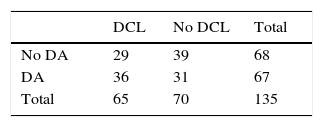La pérdida de audición es un problema significativo para las personas mayores: es el tercer problema crónico más importante durante el envejecimiento después de la hipertensión y de la artritis. Instrumentos como la Escala sobre actividades diarias dependientes de la audición –ADDA– fueron diseñados para ser aplicados en contextos no hospitalarios con el fin de detectar posibles problemas auditivos que deberán ser confirmados a través de una exploración audiológica completa. El objetivo de la investigación fue comprobar la efectividad de la Escala ADDA como herramienta para la detección de la pérdida auditiva en una muestra de 135 personas mayores asistidas en un centro hospitalario, considerando el hecho de que algunas de estas personas presentaban deterioro cognitivo leve.
Se exploró la pérdida auditiva mediante la audiometría tonal liminar y la Escala ADDA, así como la presencia o ausencia del deterioro cognitivo leve mediante la administración del cuestionario Pfeiffer.
Se concluye que la Escala ADDA puede resultar un instrumento útil a la hora de identificar a personas con pérdida auditiva, especialmente cuando la pérdida es superior a los 40dB. No obstante, es importante tener presente que en el caso de las personas con deterioro cognitivo leve, se ha observado que las respuestas al cuestionario son menos fiables, tendiendo a infravalorar los posibles problemas que la pérdida auditiva plantea en la vida cotidiana.
Hearing loss is a significant problem for the elderly: It is the third most important chronic problem after hypertension and arthritis during ageing. Screenings such as the hearing-dependent daily activities Scale –HDDA– were designed to be applied in non-hospital settings in order to detect possible hearing problems that have to be ratified through a complete audiological examination. The aim of this paper is to present the results of a research study to test the effectiveness of the HDDA Scale as a tool for detecting hearing loss in a sample of 135 elderly people, considering that some of these people had mild cognitive impairment.
Hearing loss was explored using pure-tone audiometry and the HDDA Scale, as well as the presence of mild cognitive impairment by Pfeiffer's questionnaire.
We conclude by showing that the HDDA Scale can be a useful tool to identify individuals with hearing loss, especially when their hearing loss is greater than 40dB. However, it is important to note that, in the case of people with mild cognitive impairment, we observed that their answers to the questionnaire are less reliable and tend to underestimate the potential problems posed by hearing loss in their everyday life.
Artículo
Comprando el artículo el PDF del mismo podrá ser descargado
Precio 19,34 €
Comprar ahora














